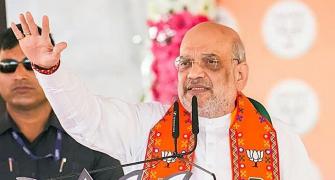The United Progressive Alliance government on Thursday took up a 'historic' bill in the Lok Sabha to ensure a minimum of 100 days of guaranteed wage employment for all rural households every year.
Members, cutting across party lines, welcomed by thumping of desks the National Rural Employment Guarantee Bill, 2004, as it was moved by Rural Development Minister Raghuvansh Prasad Singh for consideration after the government incorporated a number of amendments to the original legislation introduced in the House in 2004.
.
Congress president Sonia Gandhi asserted that the bill would fulfil one of the biggest promises made by her party in its election manifesto in 2004.
Declaring the UPA government's resolve to improve the lives of rural people, Sonia -- who spoke for the first time
on a bill -- said through the 'historic' measure, 'we are starting to give them their right so that they have a better future'.
However, Bharatiya Janata Party leader Kalyan Singh, who headed the standing committee that examined the bill picked holes in the legislation taking a dig at the Congress party, saying after 50 years in power, it had realised the need for such a law.
The bill, in its amended form, seeks to expand its purview to all rural households, instead of restricting it to below-poverty line families in the rural areas, seeks to assure minimum wages of Rs 60.
It also seeks to empower Panchayati Raj institutions to select, implement and monitor various schemes under the food-for-work programme which has been incorporated in the bill.







